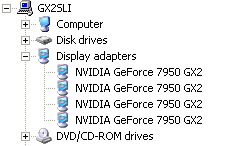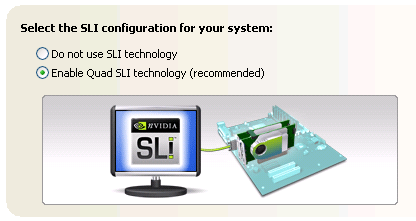System Setup and Notes
We benchmarked the eVGA Black Pearls in single board and SLI mode in some new and interesting games, versus the reference GeForce 7950 GX2, 7900 GTX single and 7900 GTX SLI. Does DIY Quad SLI give you decent performance? The answer to that question is hopefully fairly obvious, but let's have a look anyway. We busted out ye olde Dell 3007FWP, too, to bench at 2560x1600. Hoorah.
Hardware
Hardware
|
|
|---|---|
| Processor(s) | AMD Athlon 64 FX-62, 2.8GHz, 90nm, Windsor, 1MiB-core, AM2 |
| Mainboard(s) | ASUS M2N32-SLI Deluxe (nForce5 590 SLI) |
| Memory | 2GiB (2 x 1GiB) Corsair XMS2-6400 |
| Memory Timings | 5-5-5-18-2T @ 400MHz |
| BIOS Versions | 0017 |
| Disk Drive | 160GB Seagate Barracuda ST3160812AS 7200.9 SATA2 |
| Graphics Card(s) | eVGA e-GeForce 7950 GX2 Black Pearl (600/700) NVIDIA GeForce 7950 GX2 (500/600) GeForce 7900 GTX x 2 (650/800) |
| Graphics Driver | NVIDIA ForceWare 91.37 |
| Operating System | Windows XP Professional, SP2, 32-bit |
[advert]
Software
|
|---|
|
Notes
We chose F.E.A.R. and Oblivion for their hard-on-the-card approach to rendering, and Quake 4 and Half-Life 2: Episode 1 to somewhat represent the most popular licensed D3D and OpenGL 3D game engines being used in other titles.We FRAPS F.E.A.R. and Oblivion and timedemo Q4 and HL2:EP1. Therefore there's a human element added to half the benchmarks which you should bear in mind.
If in-game controls could be used for both antialiasing and anisotropic texture filtering, they were, otherwise the driver was used to force the required levels (if applicable and the game allowed it without rendering errors).
Tests were run a minimum of three times at each setting, and the median value reported. In the case of manual 'run-through' testing with FRAPS, three consecutive runs that produced repeatable results, after further analysis, were used. If values weren't part of a repeatable set, they were discarded and obtained again.
If you have any questions about our testing methods, please feel free to ask at any time in the HEXUS.community.
Bits












